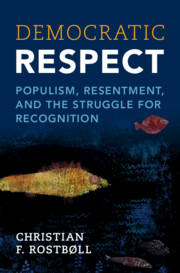Book contents
- Democratic Respect
- Democratic Respect
- Copyright page
- Dedication
- Contents
- Acknowledgments
- Introduction
- 1 Recognition and the Politics of Resentment
- 2 Respect, Esteem, and Solidarity
- 3 Rights and the Populist Claim for Recognition
- 4 Procedures, Outcomes, or Identification?
- 5 Respecting Disagreement
- 6 Publicity and Correcting Democracy
- Bibliography
- Index
Introduction
Recognition of the People
Published online by Cambridge University Press: 16 March 2023
- Democratic Respect
- Democratic Respect
- Copyright page
- Dedication
- Contents
- Acknowledgments
- Introduction
- 1 Recognition and the Politics of Resentment
- 2 Respect, Esteem, and Solidarity
- 3 Rights and the Populist Claim for Recognition
- 4 Procedures, Outcomes, or Identification?
- 5 Respecting Disagreement
- 6 Publicity and Correcting Democracy
- Bibliography
- Index
Summary
The Introduction presents the main idea of the book, namely that populism should be understood and assessed in terms of the kind of recognition for the people that it demands. The debate over the meaning and value of populism is fundamentally a debate over how democracy should recognize the people. Many people in contemporary societies feel disrespected and populism provides the recognition that they feel they have lost or never attained. The populist politics of resentment should not be understood as blindly emotional but as a struggle for recognition based on moral experiences that can be explained by people’s beliefs and principles. However, not all struggles for recognition contribute to the deepening of democracy, and we must distinguish between different kinds of recognition in order to understand why populism is often a threat to democratic principles and practices. The Introduction explains that the book is a study of the reasons people may have for supporting populism rather than the causes of populism. As a corollary of studying reasons rather than causes, populism is defined as a set of claims that can be assessed for their validity. The last part of the Introduction provides an overview of the book.
Information
- Type
- Chapter
- Information
- Democratic RespectPopulism, Resentment, and the Struggle for Recognition, pp. 1 - 21Publisher: Cambridge University PressPrint publication year: 2023
Accessibility standard: Unknown
Why this information is here
This section outlines the accessibility features of this content - including support for screen readers, full keyboard navigation and high-contrast display options. This may not be relevant for you.Accessibility Information
- 1
- Cited by
